Fixation
I’ve been with friends for the past 48 hours. Last night we were awake in front of the television until 6 AM. We slept in until noon and since then, we’ve been on high alert, full of adrenalin, exchanging our disappointments, confusions, worries, and anxiety interspersed with information, hearsay, opinion, and the occasional, very necessary joke.
My oral fixation has become quite extreme in the last days. I am popping small bites every chance I get into my mouth: dates, nuts, fruit, cold pizza, leftover rice. I am drinking tea nonstop, smoking through an entire pack of cigarettes in a matter of a few hours. It doesn’t help that all of us are tense in our own idiosyncratic ways. One friend paces from room to room. Another is fixated in front of their computer, chain smoking. Yet another is silent, smacking their mouth in bewilderment. Without saying it, we’ve become focused on sticking through this together.
I resisted writing somehow. But soon I decided to get over myself and just let go. No one is reading this but me. This is an exercise of focus. And focus is very important in circumstances when no one knows what is going on. I need focus to process the passionate waves of anger, anxiety, and sadness that overtake me. If I do not focus, I will become violent. I will risk replicating social violence, itself a textbook strategy of distraction and division.
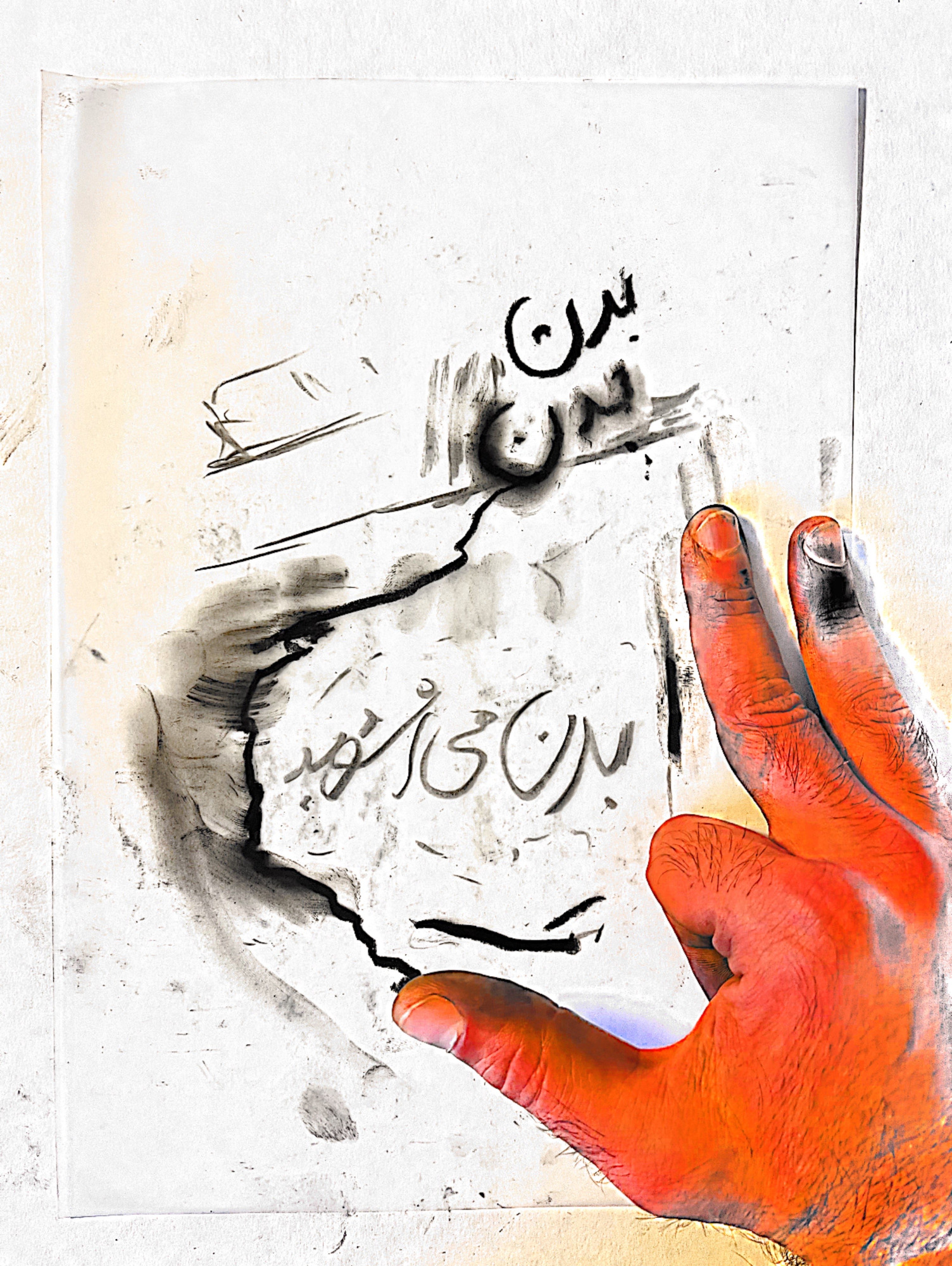
Carnival
The week before was unbelievable. A surreal display of carnival, in anticipation of change. Crowds of women and men singing, dancing, and chanting slogans in the middle of the street, stopping traffic and blocking roundabouts. Some of the things heard on the street included: “Death to this Violent Government,” “No More Lies,” “The Police Have to Dance,” “Death to the Dictator.”
I thought, one should not underestimate the political potential of a good party. I thought, this is beautiful, it’s the Summer of Love, who needs revolution, this is a social uprising of love, desire, and bodies flowing through the streets, people playing, experimenting, intensely experiencing their environment. It’s almost as if the people are metamorphosing into nature itself: strapping maple branches onto their arms, making crowns of oleander, waving palm fronds, throwing flowers at one another. Was this a rehearsal for catastrophic transubstantiation? What about the day after?
The Weather
The weather is uncanny. Every night for the past week, ominous, dark brown clouds gathered at sunset. The wind began to blow, spreading dust into the air, causing an immediate sneeze attack followed by a persistently itchy throat. As it grew darker, the sky turned brilliantly purple, lightning struck followed by shattering thunder. This left the intense impression that the sky was as unpredictable and tempestuous as the streets.
RoboCops
We walked down Valiasr Street. Traffic had come to a standstill on both sides, cars and busses packed tight and moving mere inches forward. The sidewalks were filled with people, some standing outside of their shops or homes observing, others carrying about their usual business, and others, like us, walking fervently towards where the protest was supposed to be taking place.
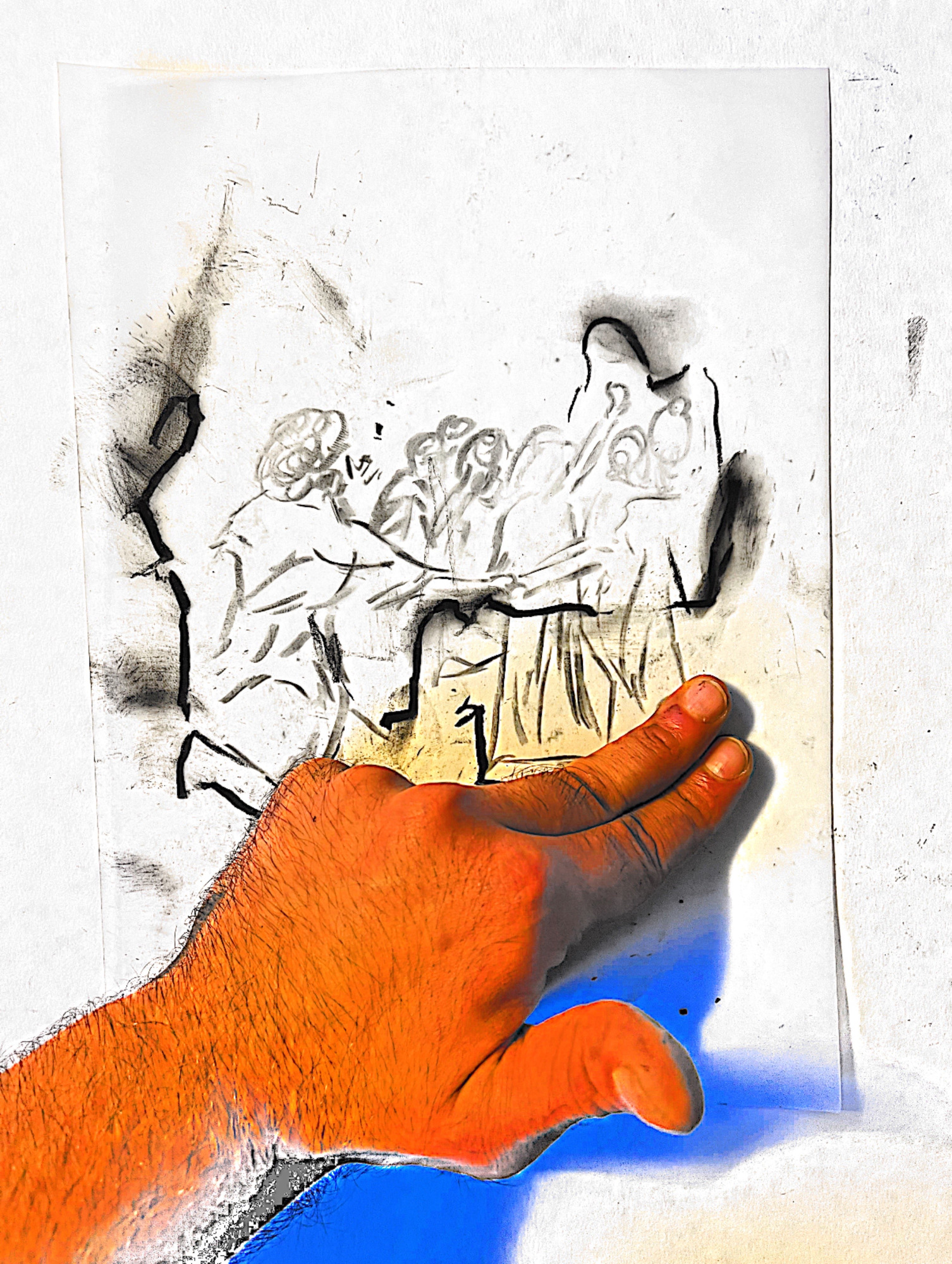
Soon we heard police sirens and saw a stretch of black vans drive through traffic, ordering vehicles out of their way. The vans were filled with police officers dressed like RoboCop. Other vans had cages attached to them. The entire procession was followed by a chain of motorcycles mounted two-by-two by officers waving batons. Every time we looked towards this show of force parading by the police would turn their heads and catch our gaze, staring directly into our eyes. It felt like they had an extra panoptic sense, able to perceive anyone looking at them from anywhere, all at the same time. This sent shivers down my spine. Were they memorizing our features? We decided it would be best to split up, not take any pictures, stop as little as possible, and to try to calm down. My face was contorted into a permanent scowl. I had to lighten it, smile a bit, walk with a relaxed gait. As if I were simply out for an ice cream.
The Bridge
We passed by a pedestrian bridge and decided we should go onto it in order to overlook the street. The bridge seemed like a safe place for the moment.
I think we were on the bridge for more than an hour. We could see the back-and-forth clashes between the demonstrators and the police. There would be moments of pause, in which the demonstrators would gather, wave their arms, and chant “Death to the Dictator.” They would assemble for a few minutes until the police would swoop down and begin hitting everyone, dispersing the crowd like a forest fire.
On the bridge, I noticed a family – mother, father, three children, and a grandmother – sitting there, their backs leaned against the railing, passing out snacks of crackers, nuts, and candies to one another. The father was pointing to his children where to look, trying to describe what was happening. The grandmother had her hands over her mouth and began waving and panting as soon as she saw crowds clashing with the police. The children seemed so very excited. What did they think they were watching? I enjoyed observing them, how it appeared they could remove themselves from the immediate situation, quite literally sit back and relax. I knew it was more complex than this. We were witnessing, each in our own way.
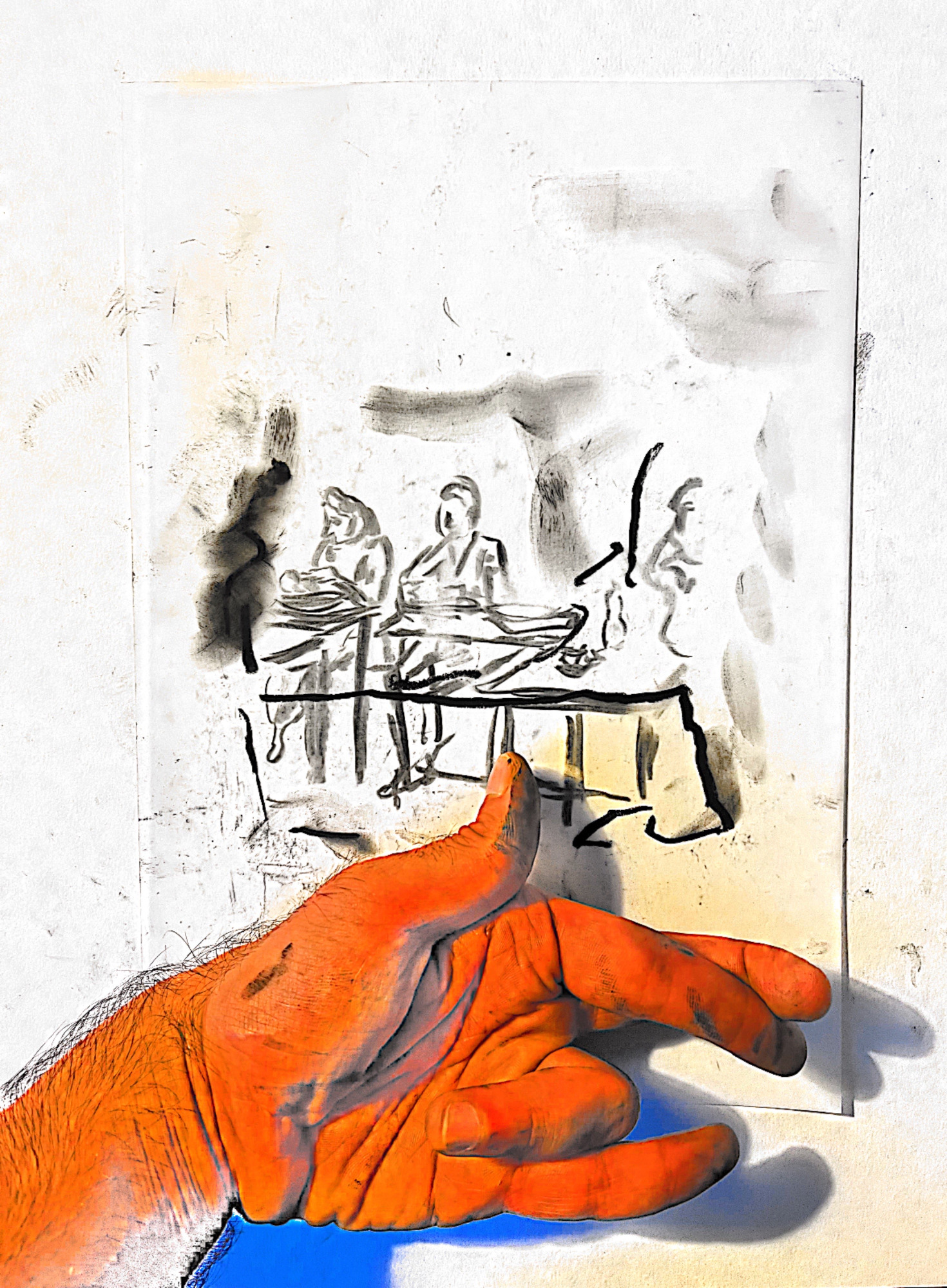
Poison
I quickly grabbed a pistachio milkshake from a street vendor and walked up Valiasr again, stopping at regular intervals to look around and listen. I overheard conversations. Some people were recounting what they had witnessed at the demonstration. Others were spreading rumors or talking about the past and what could be done today. A crowd had gathered around a man selling books laid out onto the pavement. They were all by Sadeq Hedayat, an intellectual from the ’40s and ’50s who had written many short stories and novellas, allegories of Iranian modernity and the psychic effects of authoritarianism. I saw a police motorcade drive by, twelve motorcycles in total, each officer holding up his palm in a chilling gesture of power. They drove past where I stood, turning around to drive back down, flexing their symbolic muscles.
Two women in their mid-thirties were conversing anxiously nearby. They started to cry, all the while holding up their hands in a victory sign, waving at the honking cars driving by. One of the women said to the other: “Just let them kill us now, watch, tomorrow they will put cyanide in the city’s main water reservoir.” I turned to her, wanting to console her. I said, we can only hope for the best. This felt like an inadequate consolation. I wished her good health.
The Men
The men arrived. A group of ten tall, burly, bearded guys, all wearing similar outfits: boxy, white dress shirts, oversized khakis and dirty, clog-like black boots. They held in both hands large pieces of wood, something like baseball bats. They were chasing a group of women and young men, slamming their makeshift bats onto the side of parked cars and closed doors. The women were screaming insults at them, which made the men even more angry. They were practically foaming at the mouth, raising their bats to hit the women, cursing them, telling everyone who stood by and watched to get out of their way and go home. A woman popped her head out of her building’s main gate and shouted back, NO, YOU GO HOME! As the men hurled themselves towards her direction, she slammed the door shut in their faces. A forceful blow of the bat against her door sent a metallic clang echoing throughout the street.
On the Roof
Going to the roof now to try and see better. There’s no TV or internet. It’s something to do, at least.
I am trying to restrain myself from valorizing or dramatizing what is taking place here.
I can’t see anything, it is very dark, except for the distant orange glow of Valiasr’s lights. Echoing from all around, other roofs to my left, right, front, and back, are the voices of people invisible to my eyes but undeniably present, a resounding wave of cries: God is Great! Death to the Dictator! The people are wrapped in the shadow of the night. The city is turbulent. The sky is rumbling with this call-and-response, spontaneously orchestrated by the people. It is growing in number as the minutes pass. More people come out onto their roofs, joining in, adding their voices to the mix. Clouds are boiling above our heads. It starts to rain, lightning flashes from behind the Alborz mountains. The sound of voices chanting from their rooftops mixes with the low bass note of cars driving down the main road. Shots are being fired somewhere. Is it the police shooting, or is it tear gas canisters exploding, or has someone lit a firecracker to add to the confusing cacophony of the moment?
A Surprise
I ran out of cigarettes and went back outside to buy a few packs. The shop on the main road was closed, so I walked up the hill in the opposite direction to the late-night kiosk. I noticed the trash bin out front had been set on fire. The wind was spreading the ashes into the air. I couldn’t keep my eyes open as I walked past, cinders, sparks, and heat sizzled in the air. As I got to the top of the hill, I saw many neighborhood residents had come out with their families onto the street, chanting God is Great, and throwing fireworks.
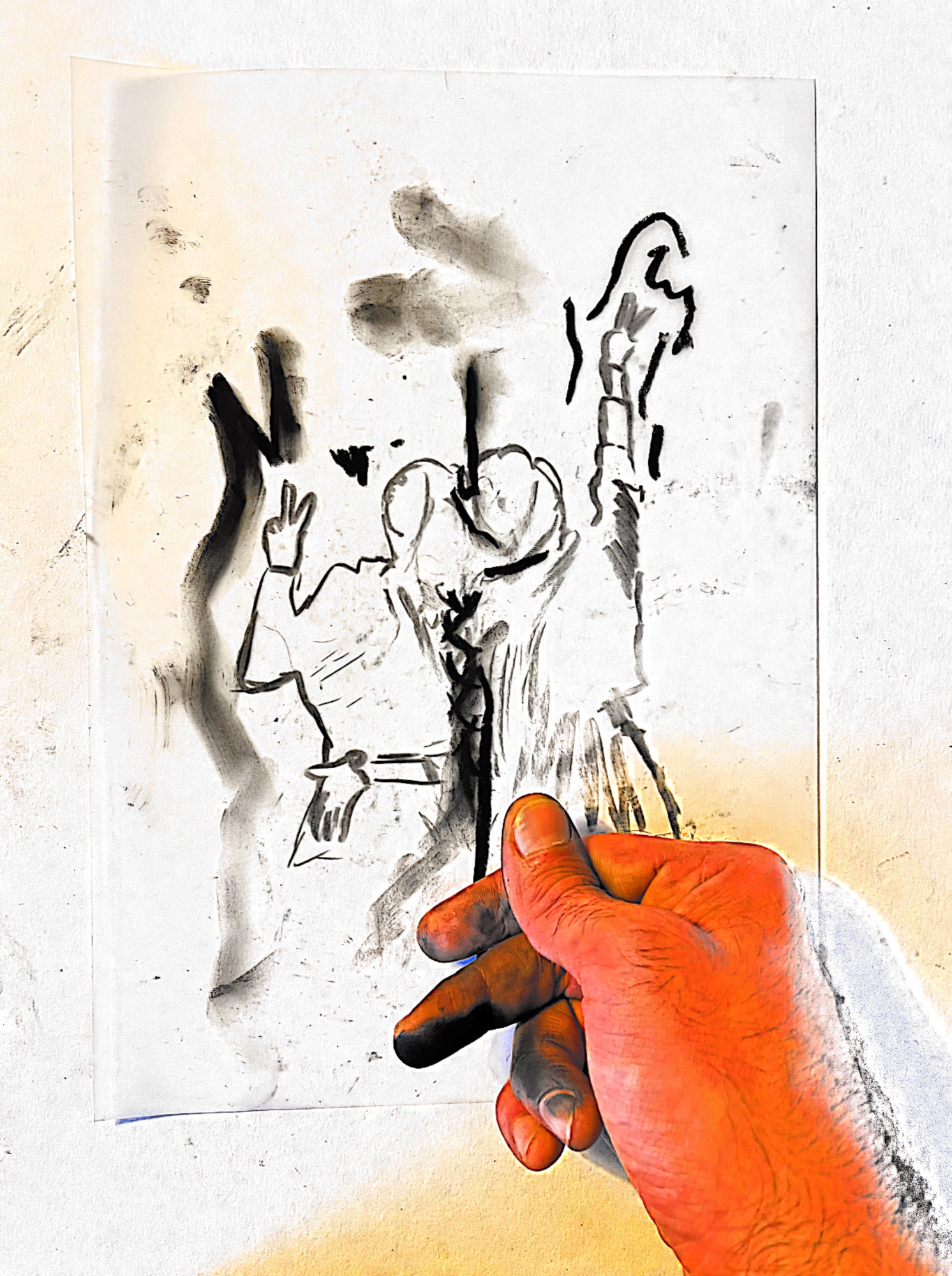
There was a construction site a few doors down and as I walked by, a group of Afghani workers were outside, their arms crossed, observing the well-to-do neighbors who had gathered. There was a small metal trash can near the site. As I walked past the workers, I let out a yelp of fear as suddenly a figure appeared out of nowhere, moaning God is Great. It took me a minute to realize that one of the workers had been hiding in the trash can, covering the lid with a piece of cardboard, waiting for someone to walk past so he could jump out in surprise. He waved his arms in the air and bellowed God is Great like a slapstick ghost, a bit silly, a bit spooky. He laughed at how shocked I looked, and I started to laugh, too. A few small children from where the neighbors stood were giggling, having noticed the man who had been hiding in the trash can.
Thresholds
I accidentally broke two glasses and a bowl yesterday. I was in the midst of kicking my legs up onto the couch when my clumsy foot hit the edge of a small table nearby, knocking two glasses and a bowl onto the tile floor. My head was turned when it happened, so the sound of so much glass shattering took me by surprise.
I remember reading something by Jalal Toufic about tripping, stumbling, and falling. It was in the context of vampire movies, when the protagonist finds himself tripping before he enters the house where the vampire sleeps during the day. Trips and stumbles belong to the category of the clumsy foot, including not only things that fall but also accidental kicks and knocks.
I had just gotten back to the house from the silent march to Freedom Square. I didn’t trip once. Not even when I had walked by three police officers holding huge rifles. I stared, though, unable to keep my eyes off their guns. They were so big, shiny, and toy-like. It was hard to imagine that inside were bullets and how easy it would be to die. If I had tripped, maybe something else would have happened. Would they have noticed it? If I had broken glass in front of them, would they have taken it as a sign of attack? Premonitions and precautions, the ability to feel that something is going to happen, to make sure to avoid getting stuck in a tight spot when it does. I was so careful then. Back home, what could have led me to not pay attention to my foot and its relationship with its surroundings, causing me to break so much glass?
Was it an altered state of consciousness? Swollen by subconscious processes linking my immediate present to other, possibly supernatural forces at hand, the lack of articulation I had been feeling lately manifested itself in a bodily gesture that precautions caution. Broken glass is a warning.
There had been reports that someone had been killed and many were shot when a crowd of demonstrators decided to attack an official compound. Who was attacking who, though? Did this occur at the moment of the broken glass? I could only guess where the threshold of no return was. When does an encounter slide into a cascade of violent confrontation? Much like stumbling upon the vampire’s lair and all of a sudden, it’s too late, the last rays of the sun are disappearing. The undead are about to awaken. More and more violence has been erupting here in the pre-dusk hours, when smoggy clouds cover the sun, slowly giving way to crepuscular shades of purple and orange.
Maybe breaking the glass was an indirect, physical confirmation of what was happening to me here all along: loosing language, the ability to articulate, loosing balance, the ability to navigate and feel out space. The vampire’s lair was drawing closer, and my slippages were a sign that his spell was all too easy to fall under, his seduction great.
The false threshold is that of resistance, the door that opens onto the site of the undead. The true threshold, what has yet to be crossed, is that of subjectivity. This door leads to a room of mirrors in which the individual sees his own reflection repeated into infinity.
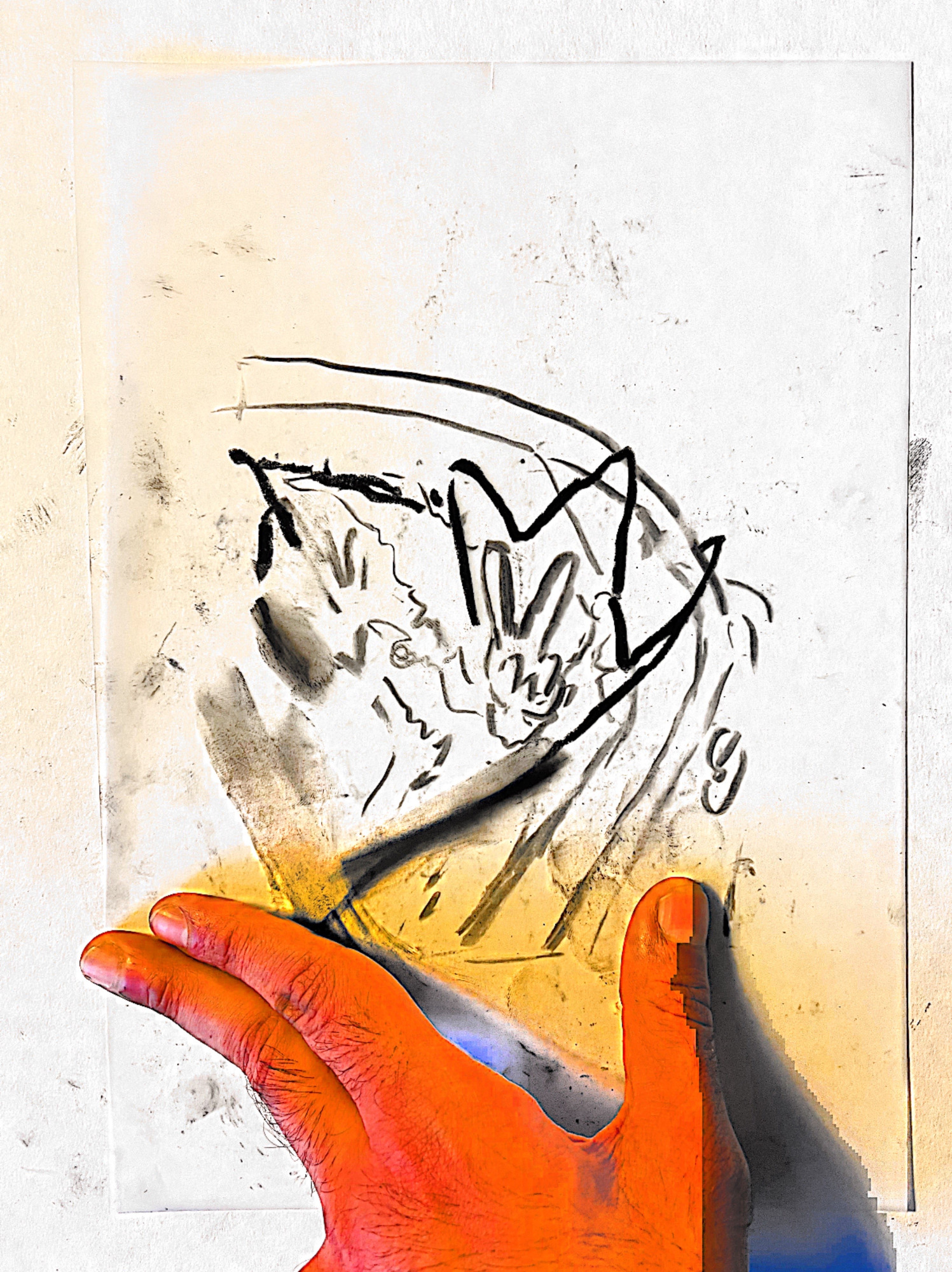
Unsure
Another moment of precaution, or was it premonition? My friend and I stood at an intersection as crowds of people shoved past us, turning the corner towards the unseen and unknown, joining the march. My friend was telling me about a sense of powerlessness they had begun to feel in the past days. It was surreal: standing there, wedged into the entrance of a pharmacy, a sea of people rolling past us, moving towards some greater force of attraction, my friend and I were unsure of what to do, speaking about powerlessness, hovering at a threshold and unable to dive in blindly.
My friend said, “I’m not sure.” They asked me, “Why are you writing?” I asked them, “Why are you taking pictures?” We both replied, “I’m not sure.”
By saying “I’m not sure,” the “I” that is involved in this experience is re-integrated. Subjectivity is at stake here and this shouldn’t be taken for granted. By saying “I’m not sure,” I mean that this “I” is unable to articulate what it wants or does or why it writes or makes images. There is something complicated going on and it is important to remember how it evades language. There are images of violence against the people spreading like wildfire. There are texts written, descriptions of violence against the people. This violence is true and real, and yet I ask myself the question of representation. How can language name violence without transforming into violent language? Language always risks acting violently due to its viral properties: words spread, reaching every nook and corner of reality, multiplying feverishly. Not who but what will reply to my voice?
To articulate a narration that examines violence and justice requires a voiceover that is never present as such. Much like Scheherazade’s wager against the King, this text is a story that, through its telling, prolongs the span of one’s life, even if that life may perish during the course of events provided by the story. By life, I mean to say that through writing I can remember I lived through this, which in turn reminds me that “I” am and must be alive, alone, solitary, always myself, even when about to disappear in a demonstration of millions.
The Man and His Images
I saw a man walking towards me. He was wearing a baseball cap, sunglasses, and a surgical mask to avoid being recognized. He walked in silence through the crowd, holding up a sheet of paper upon which was written: Where are the people? Underneath the text, there was a collection of eight images of individuals who had been wounded or killed at the demonstrations in the past days. These were the same images circulating on the news and social media. One showed a woman being beaten by a group of paramilitary and police. Another showed a dead body in the back of a pickup truck. The most disturbing was the image of a middle-aged man, fallen onto the pavement, his head mutilated from a point-blank gunshot. In the same hand as the sheet of paper, the man held a single, long-stemmed, white gladiola. He walked by in absolute silence, valiantly displaying the images and the flower. A crowd of people huddled around and followed him. They were mostly silent, at times shaking their heads and letting out a heartbroken “tsk-tsk.” They tried to get closer to him, mobile phones shooting up into the air, taking pictures of the picture or the man or both, I’m not sure.
The silence of the man and his images, of those gathered around him, of those millions marching, is this the un-present voiceover? In wishing to live, in choosing life, I say to myself that disaster must never be privileged as authentic experience. How to develop a language that can articulate what is happening here, which is to say, a language that articulates not being able to articulate? A language that knows what it does not know?
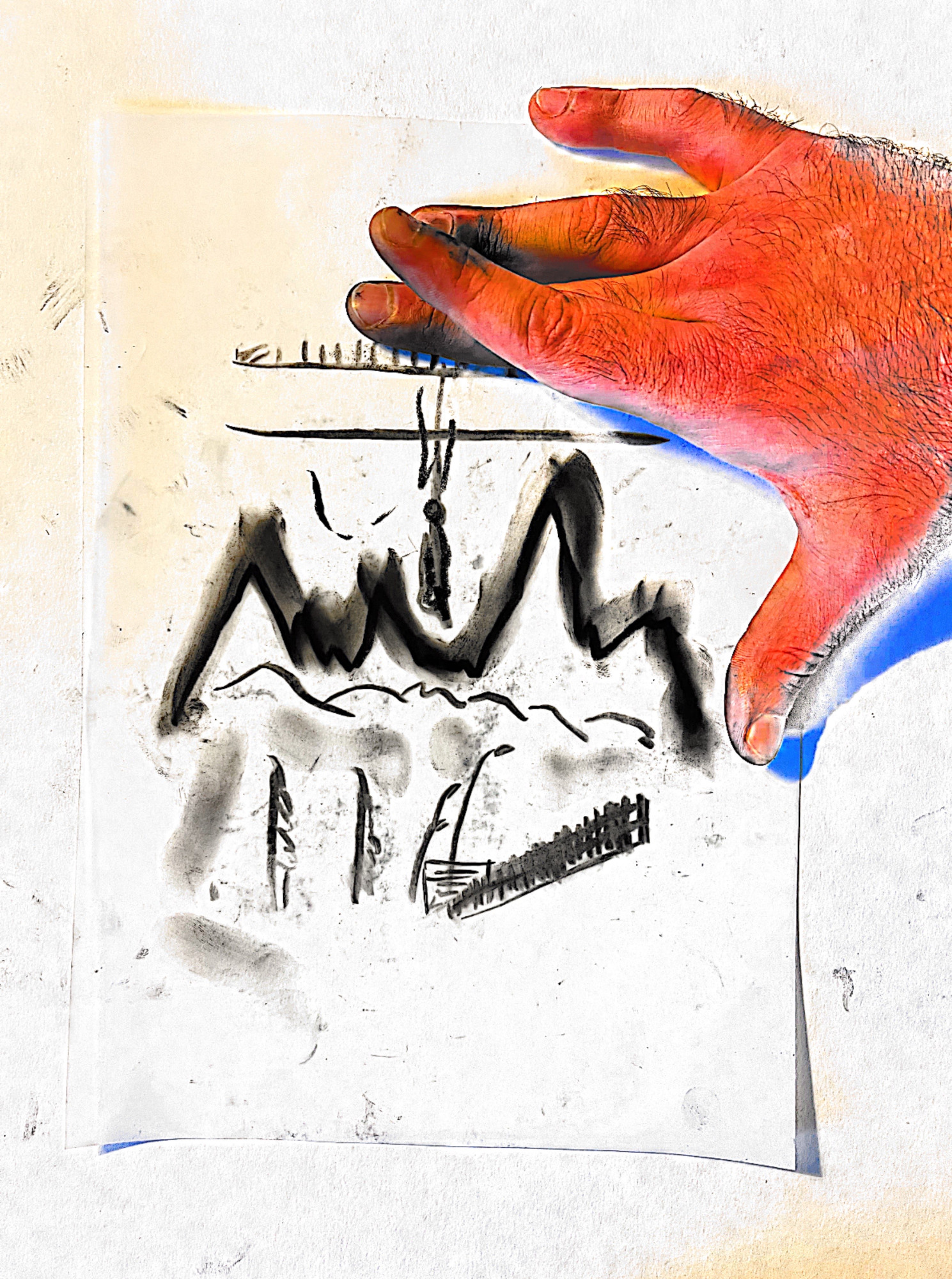
At night, the honking of invisible cars from the distance undertones the voices crying from the rooftops, a wave of endless circularity. In the silent demonstrations, each sound bears more weight than before, a voice is heard and feels offensive and loud. The hum of the TV, the velocity of the news, each version of what is happening is different, a wave of information that never manages to fully sink in or quite match up with what my body is going through. What is written is not to be read. The language I am searching for exists in my non-sensuous similarity to the environment. Is it possible for my body to turn into rocks or trees? The slogans and the silences circulate, reverberations open to any and every and no meaning all at once, like a soothsayer’s vision upon observing the carcass of a sacrificed animal.
Leaderlessness
The power of this moment is the capacity to imagine a movement that needs no leader to save the people. The people save themselves. They are subtle and clever, persistent and playful. Like holding a mirror back up to Medusa’s petrifying glare, they are using the structures that keep a certain order in place against itself.
How play fits into this becomes a major issue, as bodies are involved. Play creates relations between bodies that are primarily individual-to-individual, channeling and connecting different subjective energies. One of the interesting tensions I’ve sensed lately has been some confusion arising from the sexuality I’ve felt whether out on the street, at demonstrations, while writing, or with friends. I’ve found my sexual desire transforming beyond attraction to physical surfaces and manifesting itself more as an arousal I feel within sensuous environments. The repression and guilt reflex is strong when I sense, for example, how the appearance of the police triggers something libidinal in me, though this connection between sex and death is something I don’t want to dwell on. I’d rather focus on the everydayness of sexuality as it plays out in the revolutionary schedule. It is almost as if the militancy of the moment, its will-to-authority, tries to eradicate the supposed weakness that sexuality represents. This transformative desire, I believe, offers a chance to play together within a loaded environment, a kind of stretchy, sticky, wet dough of painful-pleasurable sensations.
It’s a Party
On my way home last night a car drove around the corner, flashed its lights at me, honked and then screeched to a halt in front. The window rolled down to reveal two girls dressed to go out, neither of them wearing headscarves. The smell of perfume wafted out of the car window. One of them, the driver, dark-haired, red-lipped, and charcoal-eyed, asked me in a husky voice, “say, only revolution.” I flashed a victory-sign, smiled, and replied, “only love.” The girl laughed and her friend in the passenger seat asked me where I was returning from. I told them I had been at the silent march earlier and was going home. They were immediately excited and asked me for details: what was it like, what happened, how many people were there, was it true that people were shot? I asked them why they hadn’t been there, they said they were too afraid to go. I assured them it had been a beautiful day despite all. They giggled and I heard one of the women say she found my way of describing the situation “very sweet.” “Come to the demonstration tomorrow,” I told them. The driver smiled and asked, slightly suspicious, “where are you from?” I smirked and explained how I was born in Tehran but grew up abroad. The two women were filled with excitement once again, switching to English, and asking if I wanted to come with them to a party. I declined the offer and the driver held out her hand. I gave her a high five and she wished me much luck and blew me a kiss. I walked home, my head fuzzy, a grin on my face. I had never had two girls try to pick me up and here it was happening, in this city, at this time.
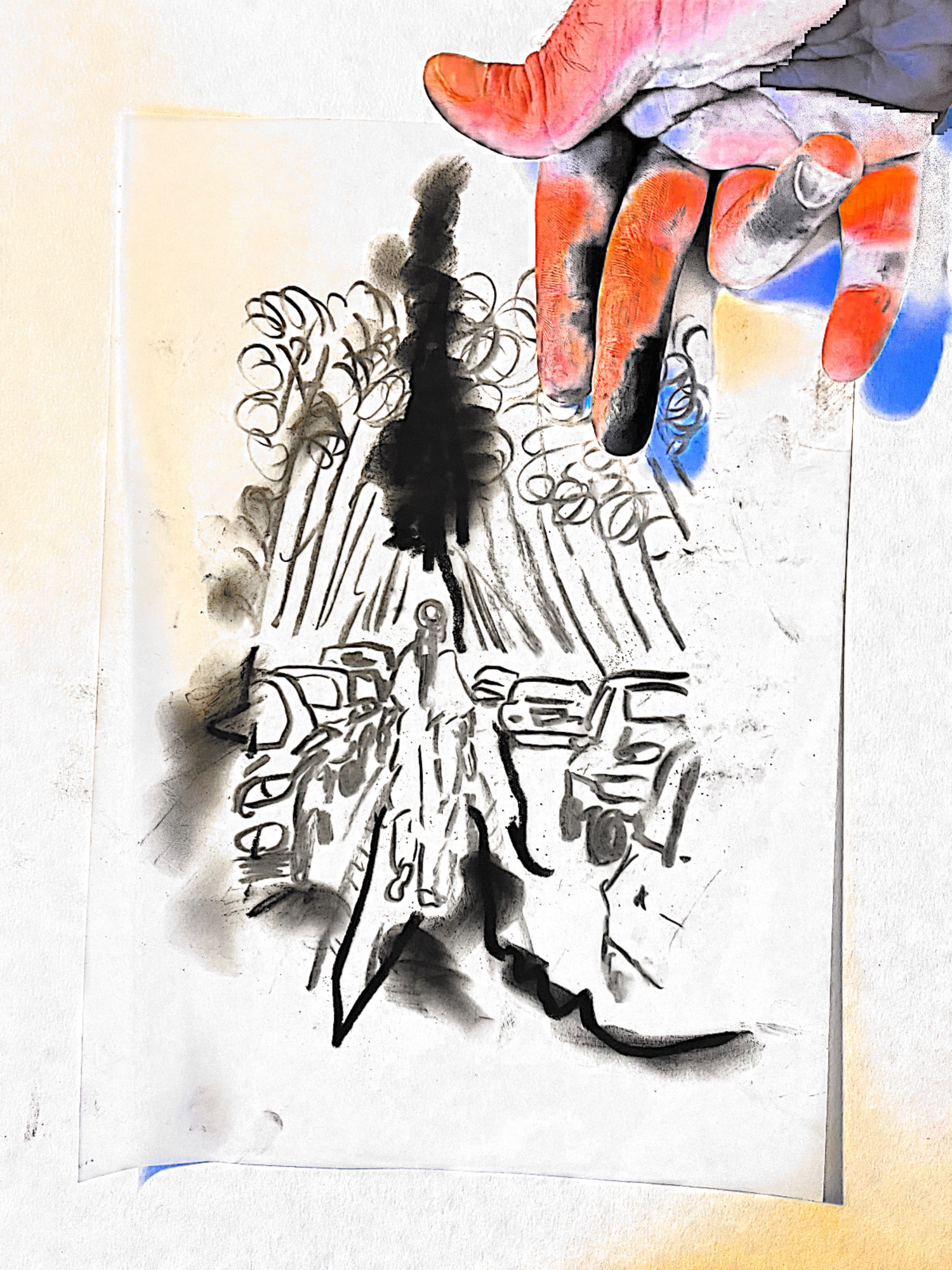
Flesh
Earlier that day I had taken a break from the silent march and found a very small, well-kept park to rest. I laid down on the grass and smoked a cigarette. I noticed many young men in the park, gathered in groups. They were all handsome, athletic, and well-dressed. They were rowdy with each other, exchanging playful touches and boyish shoves. The different groups threw glances towards one another. I noticed some were loitering around the entrance to the public toilets. Some of the men were sitting on benches, their legs spread, their arms behind their heads, tapping their fingers. It felt like they were all waiting, watching, showing off, horsing around. This was only a small section of the park, the rest of it was filled with old men playing backgammon. The scene got me excited. I was drawn to the young men’s bravado and arrogance. Were they cruising? Was I fantasizing?
I wondered if this was all a product of the day’s extraordinary energy, how the city had turned topsy-turvy, or if this was just a regular afternoon in the park. The demonstrations had certainly created a street festival energy, mixing people together more than they usually do. My second-guessing the situation, overthinking it really, felt like an unconscious split between the liveliness of the body and the paralyzing forces of ideology. In fact, the power of ideology’s hold makes it even more urgent to allow for subjective, fleshly attractions to arise and enrich the experience of these days. Sexuality is a play whose rules can only be understood through trial, error, and experimentation, offering a subjective possibility to slip, trip, and fall. The necessity to feel the body exists especially at moments when the body is on the brink of letting itself go – towards something it yearns for yet does not know. Something which, with one careless step past the false threshold, will be too late to say.
An Allegorical Tale
A woman senses after a week of restless nights and stomach cramps that her illness is not a passing matter and needs proper medical attention.
The woman had developed her illness after a friend had been arrested while trying to take pictures at a demonstration held at the memorial service for a 26-year-old woman who had been shot to death by a sniper while standing on the street corner. Plainclothes paramilitary men had stormed the demo, beating, and shooting those who had gathered, arresting the few they could capture. The service was stopped, and the mourners were told the deceased was not allowed to have a funeral, taking her body out of her weeping parents’ arms, and throwing it into the back of their truck. They drove the corpse out of the city and dumped it somewhere along the road. The woman’s friend had been released a few hours after the raid, but her camera had been confiscated and she was badly beaten. The next day, the friend called the woman and told her she was leaving the country. This was goodbye. She then hung up. The woman held on to the receiver in deep confusion. She felt the first pang of pain in her stomach, a pain that would not diminish from that moment onwards.
The woman felt that the walls were creeping in on her, that she was being strangled. Many of her friends and all her family refused to show interest in what was happening. They told her to be careful, they shrugged their shoulders and warned her of getting over-involved. She agreed that some people on the street seemed to be in it for the ride, sucking the blood of those who were risking their lives. The death of a few is necessary for the comfort of many, just not my death, they seemed to say.
On TV she saw vampire kisses, plastic hands embracing lifeless limbs, bloated beasts with lackluster eyes casting no shadows on stage, beards touching beards, sweat-stained uniforms, a kiss from one man to another, crocodile tears, and wrinkled robes. There were always flower arrangements on tables. The footage was repeated morning to night. The woman found the kisses especially chilling. They bore no resemblance to any kiss she had ever seen. It looked like the men were grazing each other’s necks. Do the undead share blood, or do they suck some form of infernal plasma out of one another’s veins? How do they nourish each other in times of scarcity? Her stomach turned again. She had to go to the bathroom. Only water came out of her.
She went to the doctor. She explained her symptoms: cramps, diarrhea, dizziness, light-headedness, dehydration. He jotted all this down and asked her if the week’s events had been upsetting. Not wanting to talk about the news with him, the woman responded indirectly. Sure, the week’s events have been upsetting for everyone. She seemed satisfied with the ambiguity of her response. The doctor gravely nodded his head and handed her a prescription for four different medications. The names, as usual, seemed odd to her; then again, she wasn’t used to taking medicine, even if it seemed everyone around her was ingesting a daily drug cocktail.
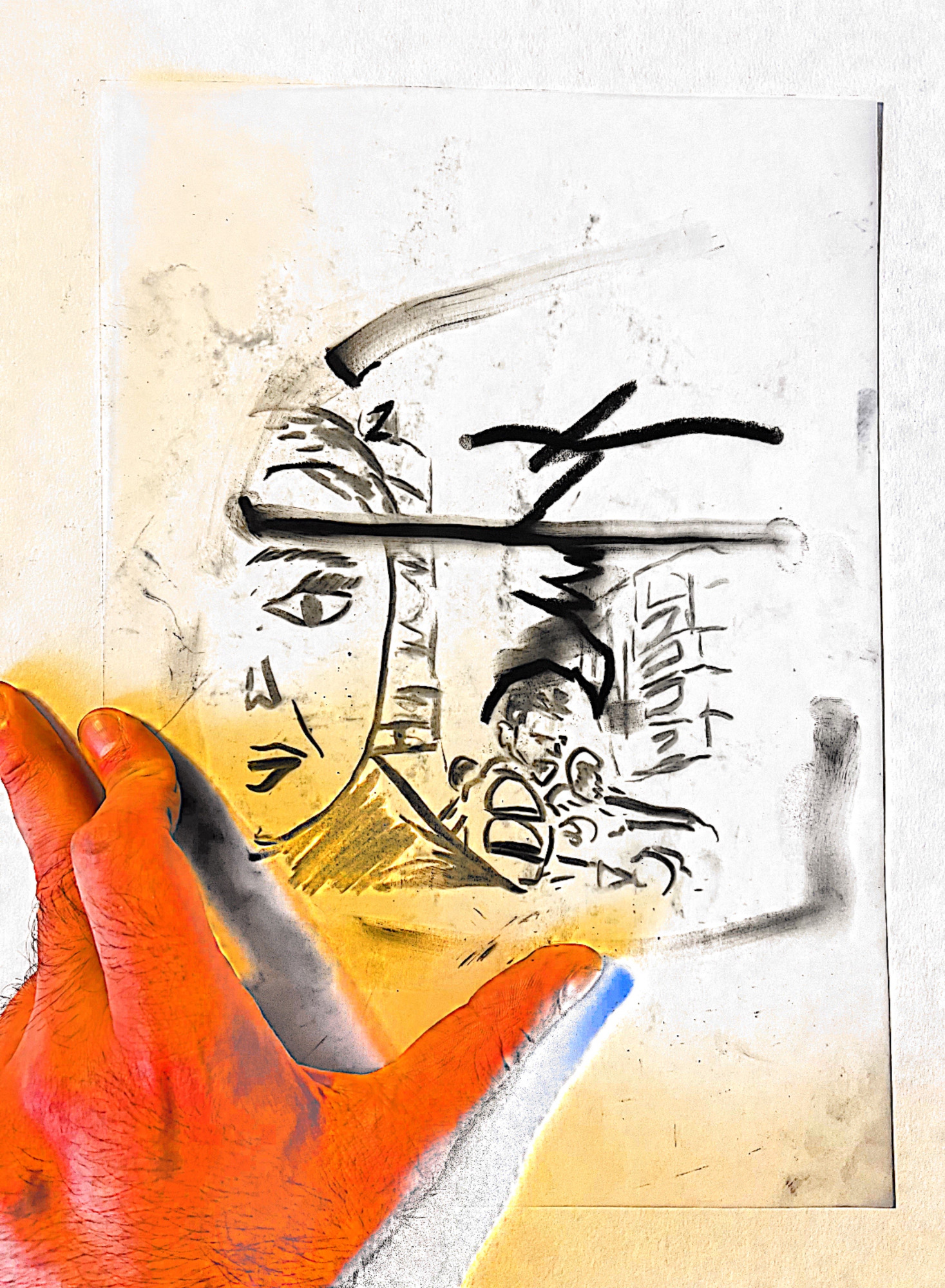
She went to the pharmacy and picked up her order. Once home, she decided to look up the names of the medicines and find out more about them. What she discovered was shocking. She seemed to not have received any medication for stomach illness. Rather, she had been prescribed a combination of anti-depressives and anti-psychotics. Did the doctor think she was schizophrenic, or did he take her for a fool? Was he trying to drug her? Was everyone, in fact, being drugged? She read about the possible side-effects of the pills, mostly audio-visual phenomena: warping or waving, textured surfaces, dancing lines, spiders, insects, form constants, lifelike objects indistinguishable from reality, hallucinated presence of people not actually there.
The Poet
And this is me, a woman, alone
At the threshold of the cold season
In the midst of discovering the polluted earth
The sad despair of the sky
And the inability of my frozen hands.
— Forough Farrokhzad
We visited Forough Farrokhzad’s grave. It was hidden amongst miniature maple trees. Two young men, maybe in their early twenties, had taken it upon themselves to safeguard her grave for the day. Both were tall and skinny, heavily perfumed, with soft hands and delicate faces. As we approached the grave, they welcomed us and offered us dates, a traditional mourning food. One of them laid his mobile phone onto the marble tombstone and played an MP3 file of Forough reciting her own poems set to traditional music. The other went nearby to light candles after laying fuchsia-colored flower petals into the stone grooves formed by Forough’s carved name.
We sat there gazing at her tomb in silence, partly out of reverence, partly out of shyness. We listened to the declamé recording and watched the two young men from the corner of our eyes. They smiled. I could smell stale sweat from the one sitting closer to me. This had mixed with his cologne to form a pungent yet agreeable summer fragrance. The other one was now washing the grave. He took a water pitcher and poured water onto the marble gently, scrubbing it across the surface with his hands. Once the MP3 file had finished playing, the men turned on a Rod Stewart song and began to sing along.
What did they see in Forough? She, too, had been a recluse and stranger in her own society. She lived her life without compromises and died too fast, too soon. Through her, the young men shared with us how they express themselves, how tenderly they relate to one another and their surroundings. They were practicing poetry.
I’ve been thinking a lot lately about the poetry of the revolution. Not out of a romantic impulse but more as a register of speech that can translate between the experience of the street and subjective emotion. For me, the poetic acts as a gateway to the political. It also measures time differently, which is important when anyway time seems to collapse into the grand expanse of the historical. The breaks and gaps, pauses for breath, the polysemy of words, the roundabout descriptions, all these poetic ways of imagining, expressing, and reflecting on a situation seem most attuned to what it feels like to be here as a body.
Surviving
The ordinary continues.
I go with my friend on our weekly hike. This time we managed to climb all the way to the top of Tochal, where the tele-cabin ends. It took us a couple of hours. We started at 8 AM and by the time we came back down, had lunch, and left for home, it was 2 PM.
I started the hike angry about the banalities of the everyday that I somehow wanted to purge. I felt that the everyday would keep me from engaging properly with the current situation. I wanted to hold on to this exceptionalism I told myself we were experiencing, to ignore all the ways in which the familiar persisted. By the time the blood had pumped through my veins and my smokey lungs were burning, I felt a surge of energy in my tense muscles. I tasted the saltiness of my sweat on my upper lip. The physical exertion was releasing something. My anger started to fade.
The everyday took on a different manifestation before us. Stretched out below in the scorching sun was the city, a monstrosity, a beauty, with its skyscrapers, highways, trees, parks, and other structures I couldn’t even recognize. There was a complete lack of orientation from this vantage point. There was no noise, the events of the previous days seemed unthinkable as the city had turned from above into a two-dimensional surface, its movements visible but details hidden, a cloud of smog rolling over its uneven surface like the caress of a lover’s wrinkled hands. It was ordinary.
We sat at the top of the mountain and drank tea that was far too sweet, trying to project images of what we had experienced the past days onto the cityscape. We were speaking the language of the city’s vital organs, trying to remind the skin of an inner vascular turmoil. But the skin didn’t care. The cartographic view of our imagination revealed how the gap between the written word and the spoken utterance resembles the lapse between the structure of the street and the different communities that pass through, live on, gather in, blockade, or revolt against it. In either case, whether on an everyday errand or at a demonstration, the importance of participation is not from the perspective of the social, rather, through the individualized concerns and commitments that articulate all the things an invisible community may eventually come to share. The view from above cannot reveal this.
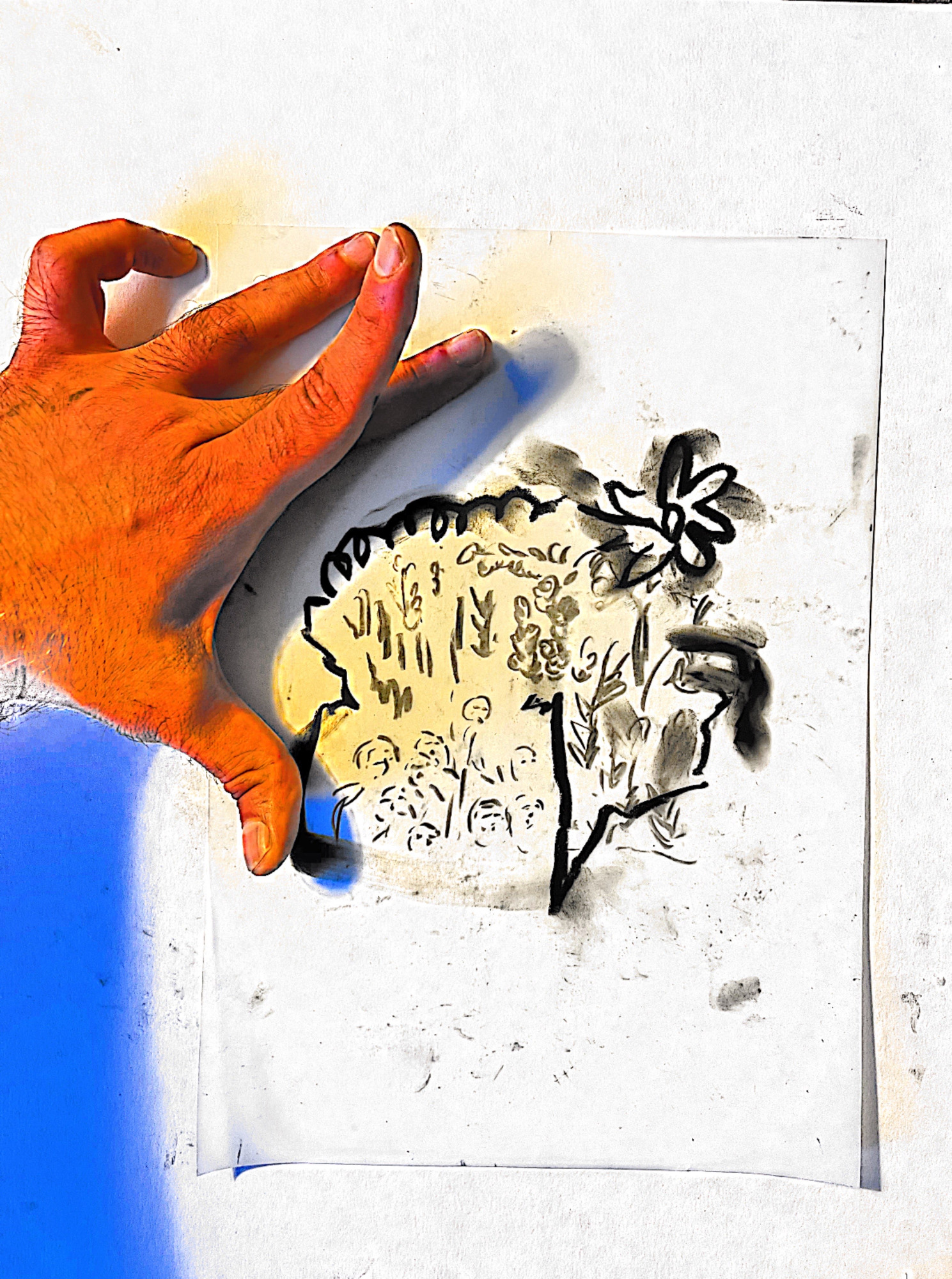
In this sense, given what’s been happening here, there is a tension between the ordinary/visible and the participatory/invisible. I’m realizing that the linguistic lisp or stutter that emerges in this space is a response to disaster. Disaster is not quantifiable, it cannot be better or worse, it is always the worst because it intermingles with the ordinary. It bridges the tensions I’m describing, aha, an explanation, it’s out of our hands, while evading any definitive linguistic expression. The disaster is slippery. Within its midst, the view from the mountain top remains the same as before or after the disaster, give or take a few blind spots. As the disaster unfolds, all the reasons for going out onto the street become ordinary: to go shopping, to go demonstrating, to go out to kill or be killed, these activities converge indistinguishably. Life goes on, though it becomes more complicated, thicker, the air becomes harder to breathe. And yet one must still breathe, eat, drink, and sleep, even if circumstances have altered behavior.
How life passes through slowly from demonstrations to riots to revolts to strikes to suppression to civil war to the unknown future, the disaster can’t be noticed and named for those living the ordinary alongside it. Or is this victory after all? One cannot say from which point on things progressed to another level, there are fuzzy spots in the memory, a hazy adaptation to a situation that tries to keep subjectivity out of tune with itself. This is the disaster’s effect on the living.
When music plays, it is there by disappearing. The sound slips into the past at the speed of memory. Mountains rise and fall, oceans live and die, is this temporality of the physical, always-on-the-brink of disappearing, is that what pushes life towards the realm of the imaginary? The transformation of matter is a principle of poetry. Perhaps, then, the task of language is to translate the complexity of physical reality into what lies beneath its surface: trembling organs, symbolic configurations, the blind night of interiority.
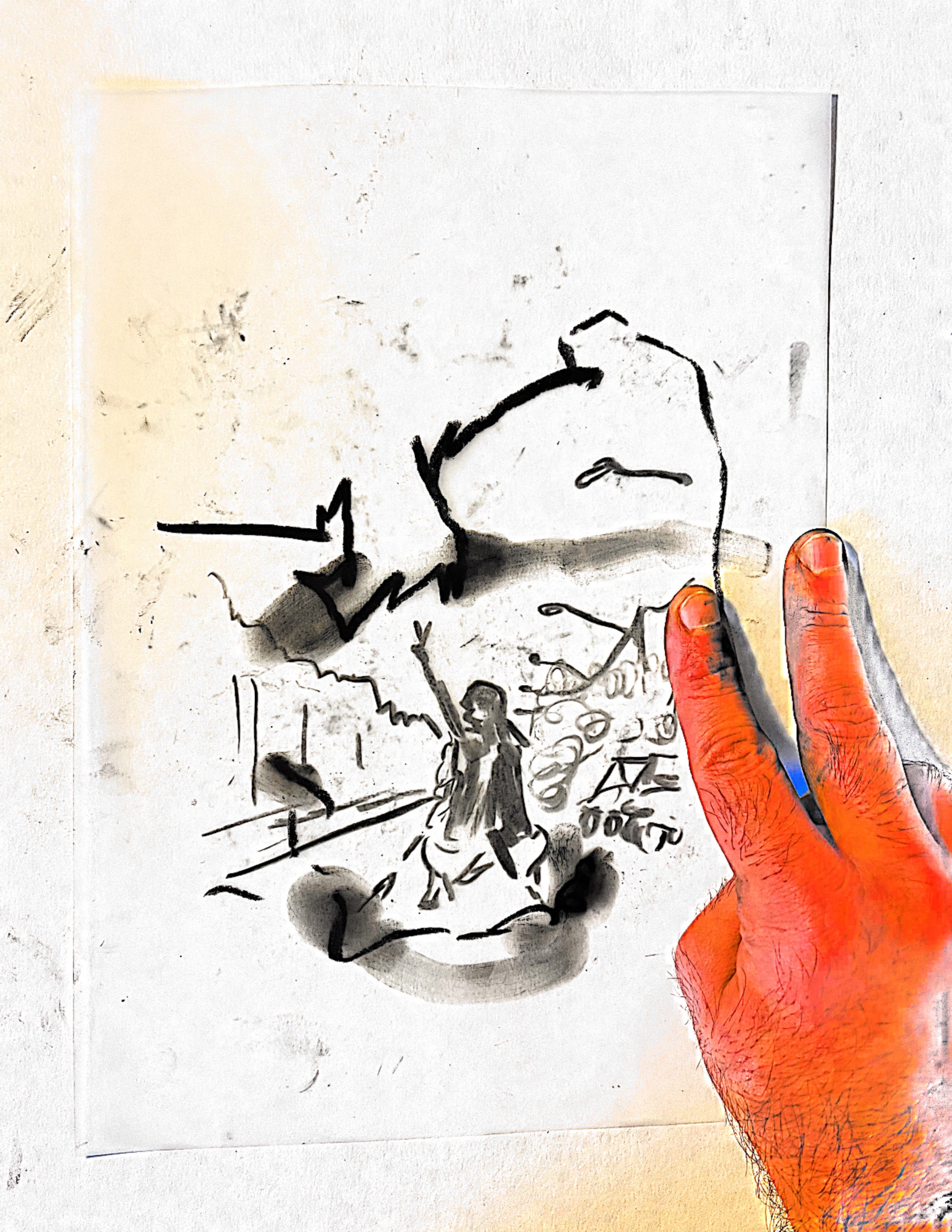
This is the third entry, written in October 2022, from Ashkan Sepahvand’s Research Diary. The previous entries, “History into Mystery” (September 2022) and “The Fire, The Times” (October 2022) can be read by clicking on their titles.
All images are courtesy of the artist.